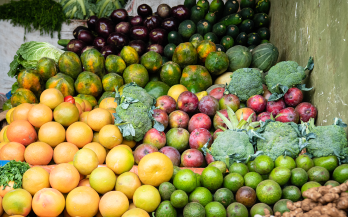


GAIN Working Paper n°48-Improving Affordability of Nutritious Foods Through Packaging Innovations
- 10/03/2025
Packaging can keep foods safe; help make them appealing, convenient, and long-lasting; and convey key information about them to consumers. At the same time, packaging is an important contributor to food system waste and a major driver of certain foods’ prices in LMICs. As such, it is a sector ripe for creative disruption as part of food system transformation – to ensure safe, nutritious foods can reach the consumers who need them, in affordable forms and with limited negative environmental impact. This paper has considered in detail three packaging innovations that could be used to make nutritious foods more accessible to lower-income consumers: single-serve packaging, reusable packaging, and selling products in bulk without individual packaging.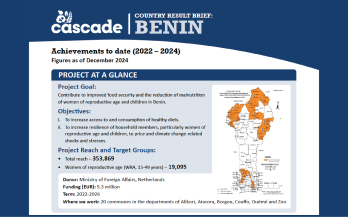
CASCADE Result Brief- Benin
- 06/03/2025
Project Description CASCADE Benin works to support and strengthen national nutrition policies in 20 communes in six of the country’s 12 departments. Implemented by CARE and GAIN in partnership with nine local organizations, the project aligns with the priorities identified in Benin’s National Food and Nutrition Policy (Politique Nationale de l’Alimentation et de la Nutrition (PNAN).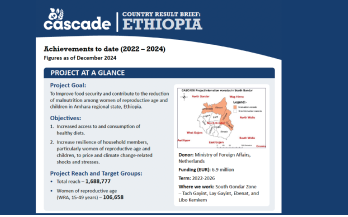
CASCADE Result Brief- Ethiopia
- 06/03/2025
The CAtalyzing Strengthened policy aCtion for heAlthy Diets and resiliencE (CASCADE) focuses on improving nutrition and food security by promoting healthier diets through multisectoral collaboration and evidencebased food and nutrition-related policies.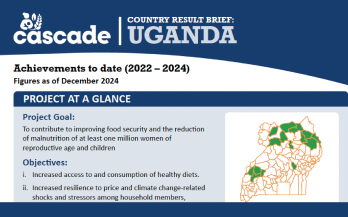
CASCADE Result Brief-Uganda
- 06/03/2025
Project Description In Uganda approximately 29% and 53% of children below the age of five years are stunted and anemic, respectively. Additionally, one-third (32%) of women aged 15-49 years are anemic. Access to and consumption of healthy diets remains a challenge for women and children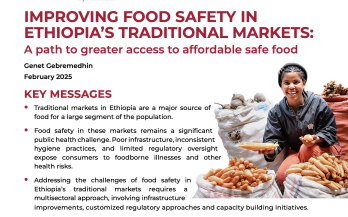
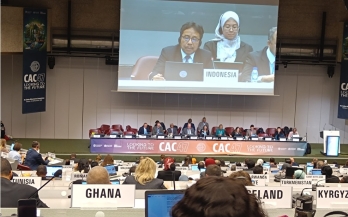
GAIN Discussion Paper n°17: Guidelines For Food Hygiene in Traditional Markets
- 05/02/2025
Many low-income, food insecure, and malnutrition-vulnerable communities in Africa, Asia, and Latin America rely on traditional markets to access nutritious fresh food. However, contaminated fresh foods in markets put the well-being of consumers at risk by compromising their uptake of nutrients, needed for proper growth and health. Unsafe food also contributes to food waste and can raise food prices and lower market vendors’ profits. Improving hygiene in traditional food markets is thus vital to improving nutritional outcomes for consumers in low- and middle-income countries and can positively contribute to market vendors’ livelihoods and sustainable local food systems. In 2022, GAIN initiated a process to champion global Guidelines for Food Hygiene Controls in Traditional Markets for Food through the Codex Alimentarius Commission (CAC), where GAIN is an observer organisation Those Guidelines were adopted in November 2024.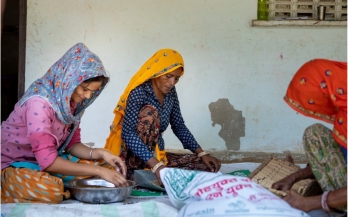
GAIN Working Paper n°46-Opportunities for repurposing waste products into nutritious foods
- 20/01/2025
Reducing food waste represents an important opportunity for shrinking the environmental footprint of food systems and supporting planetary health – and if this waste can be repurposed into nutritious foods, then it could also be a benefit for nutrition and human health. To understand the opportunities for repurposing waste products or byproducts into foods, this paper presents a rapid analysis based on desk research and key informant interviews. The analysis considers byproducts across four categories: fruit and vegetable residues, seeds and seed residues, other plant byproducts, and animal byproducts. The assessment considered availability, potential uses, consumer acceptability, food safety, nutritional quality, and feasibility.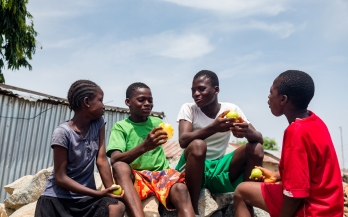
Social Protection For Nutritious Diets Programme Overview
- 14/01/2025
Millions of people around the world struggle to afford minimally nutritious diets, and social protection is critical for making healthy diets accessible. GAIN supports governments and other key stakeholders to accelerate system innovations that can make social protection investments work harder for the nutrition of the most vulnerable. Through partnerships, policy advocacy, and programmes, GAIN is working in seven countries to make social protection systems more nutrition-sensitive and better equipped to combat systemic and intergenerational inequities that limit the reach of vital services.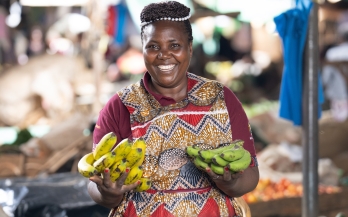
GAIN MOZAMBIQUE’S PORTFOLIO
- 01/01/2025
To address the triple burden on Mozambican’s Food system, GAIN in Mozambique is focused on innovative, scalable, and impactful initiatives aimed at identifying, updating, and disseminating legislation; developing businesses that produce and distribute safe and nutritious food; and implementing approaches to increase the demand and consumption of healthier diets by all Mozambicans